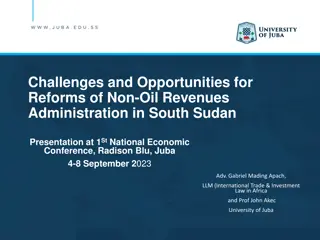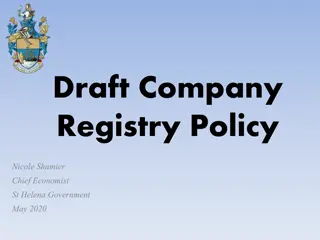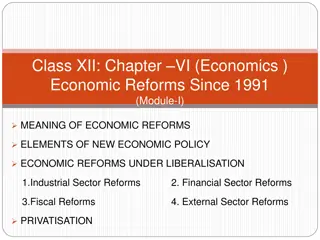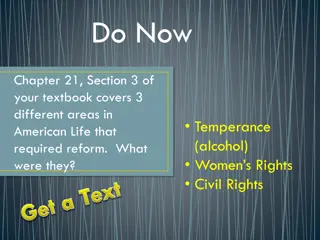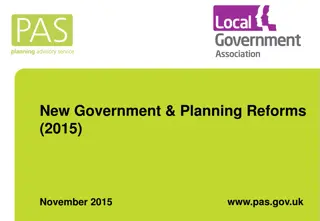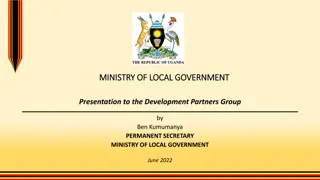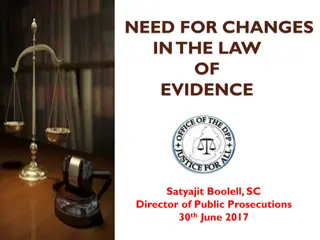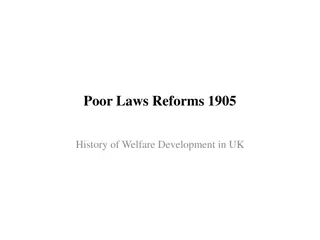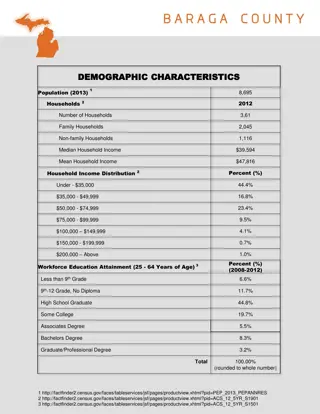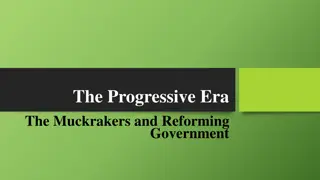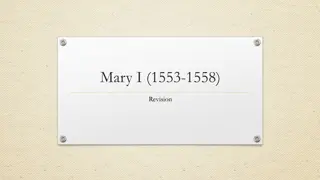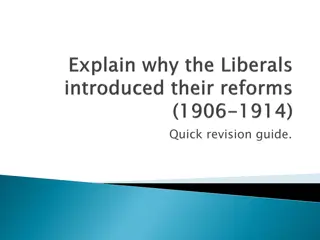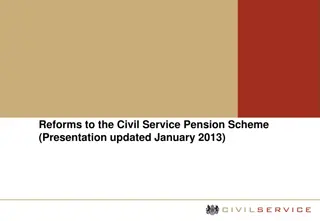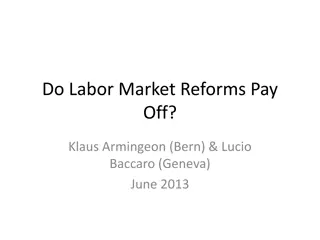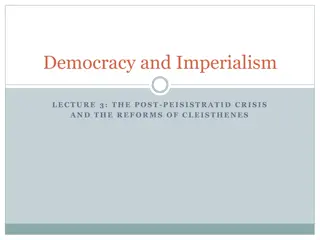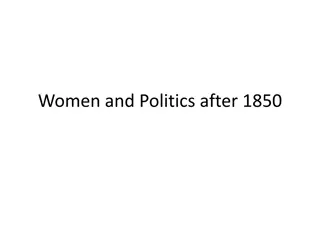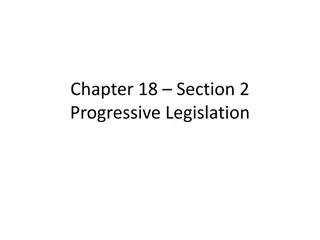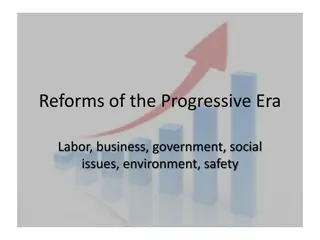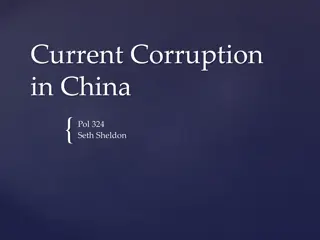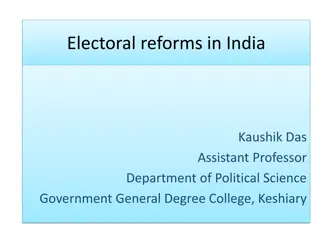Course Overview: E/Digital Government at UIN SUSKA Riau
Explore the E/Digital Government course offered by the Saide Dept. of Information Systems at UIN SUSKA Riau. The course covers topics such as digital government landscape, historical perspectives, e-government evolution, and digital transformation. Gain insights into digital government maturity mode
2 views • 24 slides
Challenges and Opportunities for Reforms of Non-Oil Revenues Administration in South Sudan
The presentation highlights the reliance on oil revenues in South Sudan and the need for reforms in non-oil revenue administration. It discusses sources of non-oil revenue, factors hindering revenue mobilization, and opportunities for reforms to diversify the economy. The objectives of non-oil reven
3 views • 23 slides
Government Services Reforms in Vanuatu Public Service Commission
Chairman Martin Mahe is leading innovative reforms in the Vanuatu Public Service Commission to improve service delivery. The focus is on a robust legislative framework, clear procedures in the Public Service Staff Manual, rigorous performance management, and policy development for effective decentra
0 views • 10 slides
Proposal for Tax and Regulatory Reforms in St. Helena Company Registry
St. Helena Government is proposing tax reforms to broaden the tax base, enhance transparency, and comply with international standards. Key aspects include taxing global profits, minimum tax charges for companies, and following EU substance rules for company management. The aim is to create new reven
0 views • 10 slides
Financial Sector Reforms in India: An Overview
In the early 1990s, India witnessed significant reforms in its financial sector, addressing issues like lack of transparency, extensive regulation, and financial repression. Key reforms included setting up expert committees, reducing SLR and CRR, implementing prudential norms, and deregulating inter
0 views • 18 slides
Understanding Government Support Agreements in Infrastructure Projects
Government support agreements play a crucial role in infrastructure projects by outlining various forms of support provided by the government to ProjectCo. These agreements help allocate risks appropriately, ensure credit enhancement, and provide direct or indirect support. However, hindrances such
1 views • 15 slides
Public Expenditure Management and Performance Evaluation
This content discusses the importance of Public Expenditure Review (PER) as a core diagnostic tool in evaluating government finances and guiding spending decisions. It emphasizes the analysis of public expenditures over time to align with policy priorities and achieve desired outcomes, highlighting
0 views • 33 slides
Governance Reform and Leadership Support in PNG: Insights from Experiments
This research delves into the conditions under which citizens support governance reform and take up leadership roles to garner broad support for reform in Papua New Guinea. It highlights the significance of citizen demand and government supply of reforms, addressing the implications of individual ch
1 views • 18 slides
Economic Reforms Since 1991: Liberalisation and Industrial Sector Reforms
Economic reforms initiated in 1991 under the New Economic Policy focused on liberalisation, privatisation, and globalisation to accelerate economic growth. Liberalisation involved deregulation of the industrial sector, abolishment of industrial licensing, reduction of public sector industries, de-re
0 views • 9 slides
Progressive Reforms and Social Movements in American Life
The Progressive era in American history saw significant reforms in three key areas: Temperance (alcohol), Women's Rights, and Civil Rights. Various laws, organizations, and individuals played crucial roles in driving these reforms, such as the 18th Amendment, the National Woman's Party, the 19th Ame
0 views • 7 slides
Insights on Ukraine Payroll Tax Reforms and Wealth Disparities: Lessons from Bulgaria
Explore the dynamics of Ukraine's payroll tax reforms and wealth indicators in comparison with Bulgaria, examining historical contexts, welfare situations, and macroeconomic factors such as GDP per capita, debt levels, and employment rates. Insights into cost of living differentials, tax structures,
0 views • 24 slides
Government Planning Reforms & Manifesto Commitments 2015
Comprehensive overview of government planning reforms from 2010-15, including priorities, manifesto commitments, and productivity plan measures. Emphasizes housing supply, home ownership, local growth, public services, and protection of green spaces. Highlights simplification of policies, community
0 views • 57 slides
Evolution of the Kenyan Water Sector: Reforms and Innovations
The Kenyan water sector has undergone significant reforms and institutional changes over the years. Beginning with the establishment of the Ministry of Water in 1974, followed by the enactment of the Water Act 2002 and subsequent reforms, new institutions such as WASREB, WSBs, WRMA, and WSPs were cr
0 views • 15 slides
Structuration Analysis of Central Government Accounting Practices and Reforms in Emerging Economies: A Study from Nepal
Delve into the nuances of central government accounting practices and reforms in emerging economies, focusing on Nepal. The study explores why key stakeholders resist externally-driven changes, investigates the unintended consequences of reforms, and highlights the role of organizational actors in s
0 views • 21 slides
Local Government Development Initiatives and Challenges
The Ministry of Local Government in Uganda presented key reforms and developments in the Local Government Landscape, including the introduction of the Programme Based Approach and the Parish Development Model. It highlighted the induction of new councillors, challenges in the political-technical lea
0 views • 14 slides
Need for Changes in the Law of Evidence: Perspectives and Reforms
Information by which facts are proved forms the essence of the law of evidence, regulating how facts are established in courts. This article discusses the exclusionary ethos, statutory reforms, challenges with hearsay evidence, and examples of reforms from different countries like England, Wales, Au
0 views • 18 slides
Evaluation of Labour Reforms 1945-51 and Their Impact on Poverty Alleviation
Following their landslide victory in 1945, the Labour Government under Clement Attlee implemented a series of reforms aimed at addressing poverty in post-WWII Britain. The Beveridge Report highlighted the giants of poverty - Want, Disease, Idleness, Squalor, and Ignorance - serving as the blueprint
0 views • 29 slides
History of Poor Laws Reforms in the UK (1905) - Development of Welfare
In 1905, the Liberal Party in the UK promised reforms for the poor laws and aid for the unemployed. A Royal Commission was appointed to address the distress caused by mass unemployment, with key figures like Beatrice Webb and Sidney Webb playing significant roles. This period marked a crucial turnin
0 views • 10 slides
Agricultural Reforms in Mauritius: Transforming the Sugar Sector for Economic Resilience
Mauritius embarked on agricultural reforms as part of its Government Economic Reform Programme in 2006, with a focus on transforming the sugar sector and enhancing food security. The process involved organizational, legal, and policy changes aimed at improving performance measures and addressing cha
0 views • 7 slides
Demographic and Government Overview of L'Anse and Baraga, Michigan
An overview of the demographic characteristics and government structures of L'Anse and Baraga, Michigan. The population, household statistics, income distribution, and workforce education levels are highlighted for L'Anse. The city government structures of L'Anse and Baraga, including village truste
1 views • 10 slides
Uncovering the Progressive Era: Muckrakers and Government Reforms
Journalists like Lincoln Steffens, Jacob Riis, Upton Sinclair, and Ida Tarbell played crucial roles during the Progressive Era by exposing political corruption, poor living conditions, and unfair business practices, leading to significant reforms in government and society.
0 views • 15 slides
Overview of Aged Care Reforms in May 2014
Aged Care Reforms in May 2014 introduced significant changes to the aged care sector in Australia. The reforms aimed at providing quality care for older Australians, reducing red tape, and enhancing services such as Home Care Packages, MyAgedCare, and the Australian Aged Care Quality Agency. Changes
0 views • 45 slides
Early Childhood Education and Care in Croatia: Overview and Reforms
Early Childhood Education and Care (ECEC) in Croatia has evolved over the years with reforms targeting parental leave, family benefits, and preschool programs. The system includes nurseries, kindergartens, and preschools, with public providers dominating. Recent reforms have introduced quality stand
0 views • 19 slides
Challenges and Reforms in Mary I's Reign
Mary I faced government problems due to religious divisions, lack of political instinct, and inexperienced supporters. Despite facing challenges, she implemented financial and naval reforms, improved local governance, and contributed to the Navy's modernization, laying foundations crucial for the de
0 views • 14 slides
Welfare Reforms in the 19th Century: A Historical Overview
In the 19th century, poverty was often blamed on individuals, leading to a laissez-faire approach by the government. Key figures like Charles Booth and Seebohm Rowntree conducted insightful studies on poverty, highlighting the need for welfare reforms. The emergence of genuine concern for the poor a
0 views • 8 slides
Overview of Civil Service Pension Scheme Reforms
Explore the recent reforms in the Civil Service Pension Scheme, covering changes in contributions, introduction of a new pension scheme, reasons for the reforms, current scheme details, and the transitioning stages. Understand the impact on pension benefits and find resources for further information
0 views • 23 slides
Labor Market Reforms and Unemployment: A Detailed Analysis
Labor market reforms and their impact on unemployment rates are examined through a Difference-in-Differences analysis in this study led by Armingeon and Baccaro in June 2013. The research questions whether liberalizing reforms actually reduce unemployment and increase employment levels. The findings
0 views • 13 slides
Athenian Democracy: Post-Peisistratid Crisis and Cleisthenes's Reforms
After the rule of Peisistratus, Athens faced a crisis that led to the reforms of Cleisthenes. Solon's reforms had set a foundation, but tensions remained between rich and poor. The Solonic constitution established a system involving magistrates, the Areopagus Council, and the Assembly. The interplay
0 views • 22 slides
Reforms in GCSE, AS, and A-Level Education in England
Reforms in GCSE, AS, and A-Level qualifications in England aim to align the educational system with global standards, enhancing the rigor of content and assessments. Changes include new grading scales, stand-alone AS qualifications, and expanded subject offerings. These reforms impact students start
0 views • 30 slides
Women in Politics and Local Government Post-1850
This overview explores the involvement of women in politics and local government after 1850 in the UK. It discusses their roles in local government reforms, including the Poor Law Amendment Acts and Municipal Corporation Act, as well as their participation in school boards and boards of guardians. H
0 views • 18 slides
Progressive Reforms in the United States
Progressive movements in the United States during the late 19th and early 20th centuries led to significant legislative changes at the federal, state, and municipal levels. Efforts focused on expanding the role of government in social welfare programs, municipal reforms to combat corruption, innovat
0 views • 10 slides
Progressive Era Reforms: Labor, Business, Government, and Social Changes
During the Progressive Era, significant reforms were implemented in labor, business, government, and social issues. Labor unions gained power, child labor laws were enforced, workplace safety improved, and the spoils system was reformed to address corruption. Political machines in cities were also c
0 views • 9 slides
Public Sector Reforms in Malawi: Impact on Economic Performance
The presentation explores the link between public sector reforms and economic underperformance in Malawi. It discusses the history of public sector reforms in Africa and Malawi, employee relations, and various generations of reforms. The context of Malawi's economic realities at independence and res
0 views • 63 slides
Understanding Corruption in China: Insights and Reforms
The state-controlled nature of many prominent businesses in China, mixed with instances of corruption and inefficiency at various levels, highlights challenges faced by the government and public discontent. Economist Adam Hersh suggests a complex relationship between government-owned and privately o
0 views • 10 slides
Understanding Electoral Reforms in India
Electoral reforms in India are crucial for ensuring free and fair elections, which are fundamental to the success of democracy. This article delves into the need for electoral reforms in India, discussing issues such as money power, muscle power, criminalization in politics, and the misuse of offici
0 views • 15 slides
Inclusion Programme & SEND Reforms in Sheffield Update for School Governors (June 2016)
Sheffield is undergoing significant reforms in its inclusion programme and SEND services, aiming to provide better support for vulnerable young people and their families. The vision includes a shift towards a locality model, ensuring high-quality inclusive provision, robust mental health support, an
0 views • 13 slides
Challenges and Options for Ensuring Affordability in SEND Funding
Northumberland County Council faces funding challenges in providing support for Special Educational Needs and Disabilities (SEND) due to lower government funding levels, increased demand for SEN places, and existing financial burdens. The 2014 national SEND reforms have highlighted the need for sust
0 views • 10 slides
NSW Consent Reforms: Legislative Changes and Impacts on Sexual Assault Laws
In the past 40+ years, the NSW legislative landscape has seen significant changes in addressing sexual assault, culminating in the recent Crimes Legislation Amendment (Sexual Consent Reforms) Act 2021. These reforms implement recommendations, introduce affirmative consent model, and enhance provisio
0 views • 32 slides
Big Bang Reforms in China's Financial Sector by Sunanda Sen
This article discusses significant reforms in China's financial sector, including changes in capital account regulation, balance of payments components, financial instabilities, and offshore centers like Shanghai FTZ. The reforms cover topics such as exchange rate adjustments, deregulated interest r
0 views • 8 slides
Deep Dive into Nikita Khrushchev's Reforms and Removal from Power
Explore the transformative reforms and eventual downfall of Nikita Khrushchev during his tenure from 1956-1964. Delve into topics like Cold War dynamics, agricultural reforms, de-Stalinization, control of Eastern Europe, and reasons for his removal from power. Uncover the debates surrounding the ext
0 views • 7 slides

